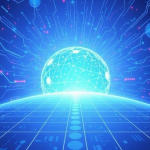Technology is evolving at an unprecedented rate, transforming the way we live, work, and interact with the world around us. From smart homes that automate daily tasks to artificial intelligence (AI) that is revolutionizing industries, technological advancements are reshaping our world in ways we never imagined. The integration of cutting-edge innovations is not only making life more convenient but also redefining entire industries, economies, and societal structures.
In this article, we will explore how technology, particularly smart home systems and AI, is shaping modern society, the benefits and challenges that come with it, and what the future holds for this ever-advancing landscape.
The Rise of Smart Homes: A New Era of Convenience
Smart homes have emerged as a symbol of modern living, offering homeowners convenience, security, and energy efficiency like never before. With the rise of the Internet of Things (IoT), devices in our homes can now communicate with one another, creating an interconnected environment that responds to our needs in real time.
How Smart Homes Work
At the heart of smart homes are interconnected devices controlled via smartphone apps, voice commands, or automated settings. Smart home systems integrate with artificial intelligence, allowing homeowners to manage lighting, heating, security, and even appliances with a single touch or voice prompt.
Some of the most popular smart home technologies include:
- Smart Assistants: AI-driven devices like Amazon Alexa, Google Assistant, and Apple Siri enable voice control for various tasks.
- Smart Security Systems: Video doorbells, motion detectors, and facial recognition systems enhance home security.
- Automated Lighting and Climate Control: Systems like Nest and Philips Hue adjust lighting and temperature based on occupancy and time of day.
- Smart Appliances: Refrigerators that monitor grocery supplies, washing machines that optimize detergent use, and ovens that preheat remotely are making everyday tasks more efficient.
Benefits of Smart Homes
The advantages of smart homes extend beyond convenience. Here are some key benefits:
- Energy Efficiency: Automated lighting and climate control reduce energy waste, lowering utility bills.
- Enhanced Security: Smart security systems provide real-time surveillance, remote monitoring, and automatic alerts.
- Increased Comfort: Personalized settings for lighting, temperature, and entertainment improve the quality of life.
- Time-Saving Automation: Daily routines are streamlined with voice commands and automation, freeing up valuable time.
Despite these benefits, smart homes also raise concerns about privacy, data security, and the potential for system malfunctions. As homes become more connected, cybersecurity threats and hacking risks become more significant issues to address.
The Power of AI: Transforming Industries and Daily Life
Artificial Intelligence is one of the most influential technologies reshaping the world today. AI has permeated nearly every sector, from healthcare and finance to entertainment and manufacturing.
AI in Everyday Life
AI is no longer a futuristic concept—it is embedded in the tools and applications we use daily. Some common examples include:
- Personal Assistants: AI-powered chatbots and virtual assistants help with scheduling, reminders, and online shopping.
- Recommendation Systems: Streaming services like Netflix and Spotify use AI to suggest content based on user preferences.
- Autonomous Vehicles: Self-driving cars rely on AI to navigate and make real-time driving decisions.
- Healthcare Innovations: AI is revolutionizing diagnostics, drug discovery, and personalized medicine.
AI in Business and Industry
Industries are leveraging AI to optimize processes, reduce costs, and enhance customer experiences. Some notable applications include:
- Healthcare: AI-powered diagnostics detect diseases like cancer at early stages, while robotic surgeries improve precision.
- Finance: AI algorithms analyze market trends, detect fraud, and automate trading decisions.
- Manufacturing: Smart factories use AI-driven robotics for assembly lines, reducing human errors and increasing efficiency.
- Retail: AI chatbots and virtual shopping assistants provide personalized recommendations and customer support.
Challenges and Ethical Concerns
While AI offers immense benefits, it also presents challenges that society must address:
- Job Displacement: Automation threatens traditional jobs, requiring workers to upskill or transition to new roles.
- Bias and Fairness: AI systems can inherit biases from training data, leading to unfair decisions in hiring, lending, and law enforcement.
- Privacy Concerns: AI-driven data collection raises ethical questions about consumer privacy and data security.
- Regulation and Accountability: As AI becomes more powerful, governments and organizations must establish guidelines to ensure responsible use.
The Future of Technology: What Lies Ahead?
The rapid evolution of technology is reshaping every aspect of human life, and the future promises even more profound changes. Here are some key trends that will define the coming years:
1. Smart Cities
Smart home technology is expanding beyond individual households into entire cities. Smart cities integrate IoT, AI, and big data to improve infrastructure, reduce traffic congestion, and optimize energy use. Innovations like AI-driven traffic management, smart grids, and automated waste collection will enhance urban living.
2. AI-Powered Healthcare
AI-driven healthcare will continue to advance, offering personalized treatments, early disease detection, and robotic-assisted surgeries. Telemedicine powered by AI will improve access to healthcare in remote areas, making medical services more efficient and accessible.
3. Autonomous Systems
From self-driving cars to drone deliveries, autonomous systems will become more prevalent. AI-driven automation in transportation, logistics, and agriculture will enhance productivity and reduce human intervention in repetitive tasks.
4. Human-AI Collaboration
Rather than replacing humans, AI will increasingly work alongside people, augmenting human capabilities. AI-powered decision-making tools will assist professionals in fields like medicine, law, and engineering, leading to more informed and accurate outcomes.
5. Ethical AI and Regulation
As AI becomes more integrated into daily life, ethical considerations and regulations will be crucial. Governments and organizations will focus on creating policies to ensure fairness, transparency, and accountability in AI-driven systems.
Conclusion: Embracing the Future with Responsibility
Technology, from smart homes to AI, is transforming the world in extraordinary ways. It is making life more convenient, efficient, and connected, but it also brings challenges that must be carefully managed. The rise of AI, automation, and smart infrastructure will continue to reshape industries and redefine the way we live.
To fully harness the potential of these technologies, society must strike a balance between innovation and ethical responsibility. Addressing privacy concerns, job displacement, and AI bias will be crucial in ensuring that technology serves humanity in a fair and beneficial way.
As we move forward into a tech-driven future, embracing these changes with awareness, adaptability, and responsibility will be key to creating a world where technology enhances our lives while maintaining human values.






Leave a Reply